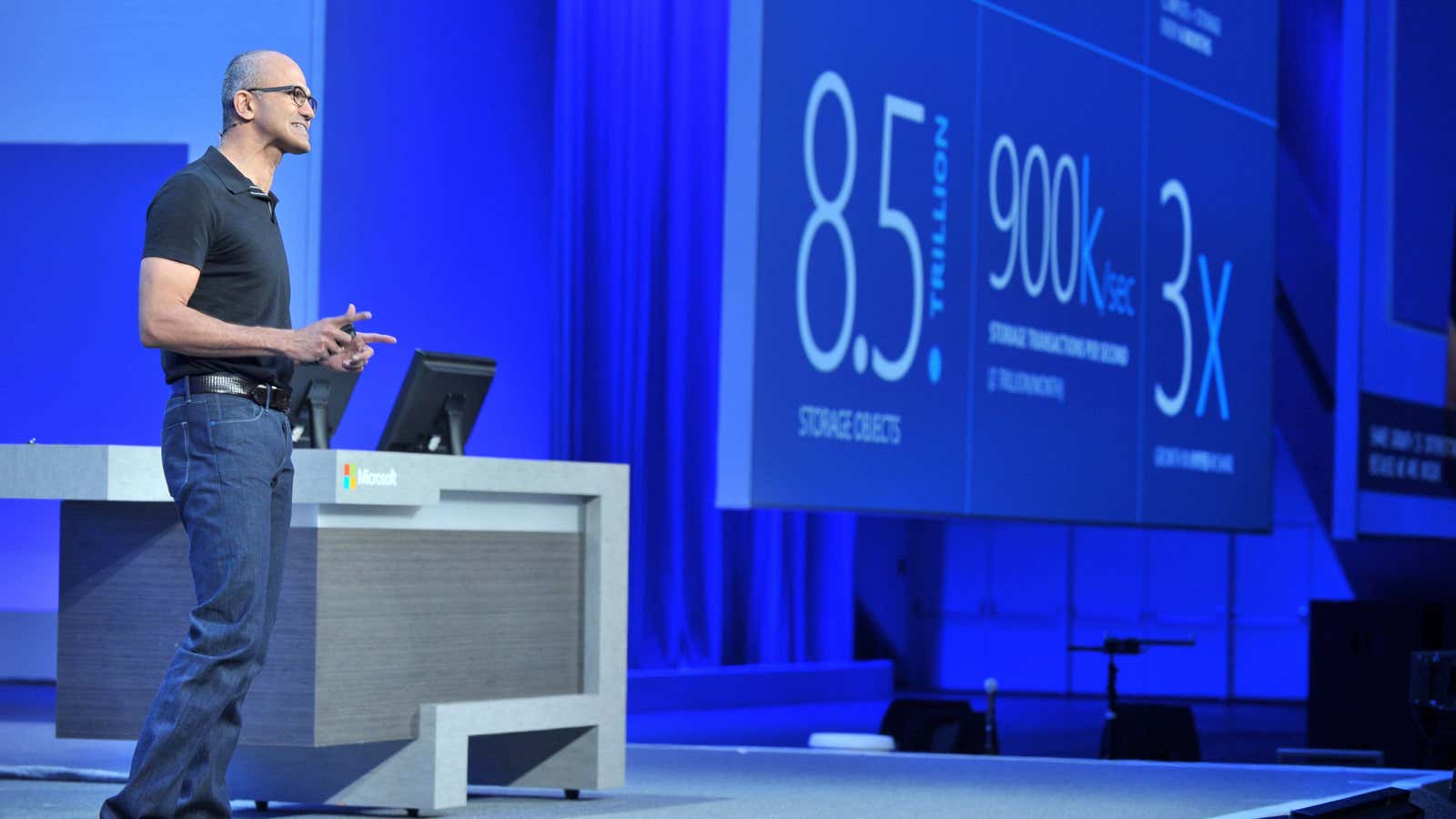It’s been a fun couple of weeks for Microsoft watchers. First Ford CEO Alan Mulally dominated headlines as a favorite for the top job at Microsoft, even as his board publicly said he would stay at the auto manufacturer at least through the end of 2014. Then, last night, Bloomberg reported that Steve Mollenkopf, chip-maker Qualcomm’s chief operating officer was in consideration. This morning Mollenkopf was promoted to CEO (paywall) of Qualcomm.
Amid the rumors about external candidates, some Microsoft watchers have focused on Satya Nadella, the Indian-born head of Microsoft’s cloud and enterprise division who is known to staff as one of the most articulate and intelligent people in the company. A Microsoft employee since 1992, Nadella rose through the ranks to lead its search efforts with Bing, head its servers business and eventually to lead the cloud division, which the company says is enjoying fast growth with revenues doubling in the past quarter. Nadella sat down with Quartz at the Le Web conference in Paris this week to talk about Microsoft’s focus on the cloud.
He declined to comment on the Microsoft CEO search, but spoke at length about the future of his company. Here’s what Nadella said:
On how the shift to the cloud is changing how the technology industry works
“In the past, there was hardware, software and platforms on top of which there were applications. Now they’re getting conflated. That is all going to get disrupted by the move to the cloud. Because when somebody is running their application on Azure [Microsoft’s cloud platform], they’re not having to buy hardware, to set up their own network, or to do a lot of things that they did in the past. So what used to be these distinct categories are getting mixed up in the move to the cloud.”
On following the money
“There’s $2 trillion of IT spend [globally this year]. That’s all IT spend: it includes things like how much you spend on devices. phones, tablets and PCs as a consumer or as a business. The amount people spend on software on top of those is included. And the back end: hardware, server storage, networks, everything that Cisco and Dell and HP make. Then software we make, like Windows Server; middleware from Oracle or IBM; things people use to build the applications; things like SAP, Salesforce, Dynamics.
“Then the next question is what is the shape of that spend? And that’s one of the places that we as a company have bet that there are two forms in which which people will consume technology is in devices and services or in cloud and devices broadly.
“It’s all going to move to the cloud in some shape or fashion. It need not all be a public cloud run by one North American company. It can be a private cloud or a public cloud. In our case we’re participating in both those markets. We’ve built a big business here. But we’re still a low-share player. We have a significant commercial business, but in the big scheme of things, when you say $2 trillion, we’re nothing. So the way we look at it is how do we become part of the fabric which is helping with this digitization of everything.”
On the origins of Microsoft’s move to the cloud
“In some sense, it was both difficult and obvious. Internally, we were building lots of services. Take Bing. We needed to build a new cloud platform to crawl the web, understand the web, serve the web. We were also re-architecting Skype in a mobile-first world. So it was our own need that drove Windows Azure and the cloud platform.”
On what the cloud business means to Microsoft
“We have a pretty massive commercial business: 58% of our overall business is commercial. That’s about $45 billion of our revenue. Cloud is just emerging but it’s high growth. In the last quarter the cloud business grew over 100%. Azure is adding over 1000 customers a day and over 50% of Fortune 500 companies are using Azure. There is also the private cloud. We make the cloud infrastructure we’re using available as servers for others, and that is going through double-digit growth both. So all put together we’re doing very well.”
On whether the future of Microsoft is as a services company
“I think reconceptualizing Microsoft as a devices and services company is absolutely what our vision is all about. Office 365 and Azure on the services side are representative of it. Does that mean we won’t have our software available for other people to build on? No. Windows is available outside of our devices. Windows server is available outside of our data centres. We think that’s important because there will always be distributed computing. But at the same time, there is also the customer expectations that we should complete the scenario. That means running a cloud platform, running a cloud service. So were conceptualising the future of Microsoft along those pivots.”
On whether being CEO of Microsoft is an impossible job
“I’m not going to speculate at all.”
